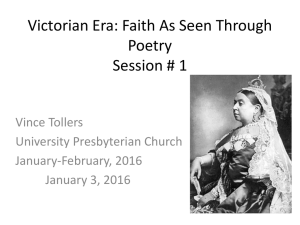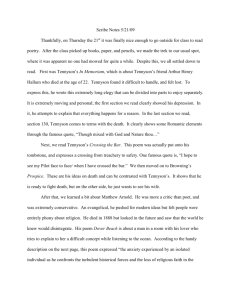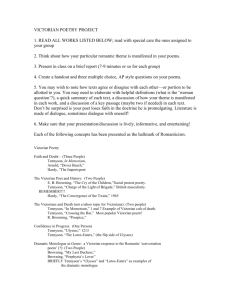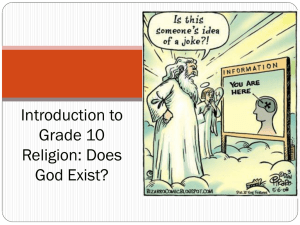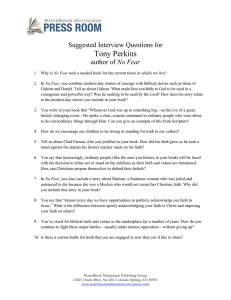Victorian Era: Faith As Seen Through Poetry
advertisement
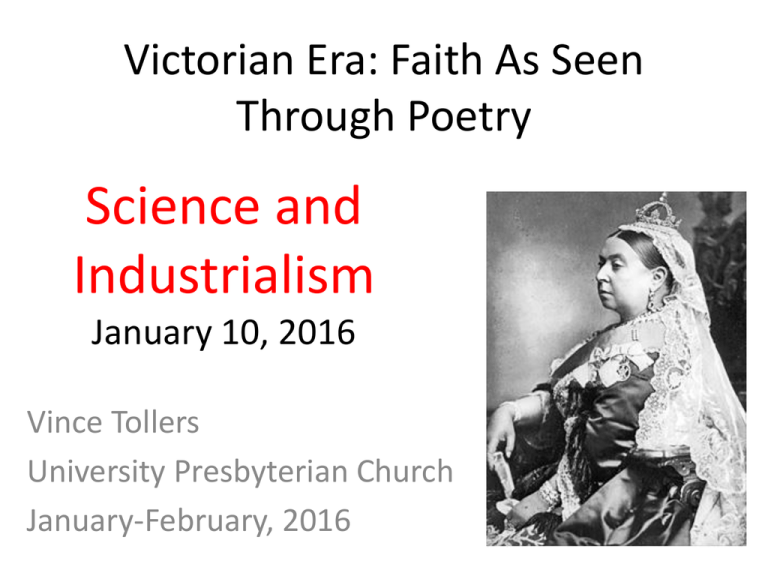
Victorian Era: Faith As Seen Through Poetry Science and Industrialism January 10, 2016 Vince Tollers University Presbyterian Church January-February, 2016 Scheduled Topics • • • • • • • January 3 January 10 January 17 January 24 January 31 February 7 February 14 Introduction and Change Science and Industrialism Education and religion God and Christ Nature Sense of self Romance/love (St. Valentine’s Day) The Victorian Challenge: Change • Sense of self in the universe • Science and industrialization • Religion and education • England’s place in the world: social justice • War Background • Monarchs • Leading characteristics • Dateline of poets and novelists Monarch and Events Victoria: 1937-1901 1830–48: stressful growth--first railways and Reform Parliament 1848–70: prosperity, optimism, and stability 1870–1901: breakdown of internal and external compromises Edward VII: 1901-10 1901-19 modernism meets indolence and indifference George V: 1910-36 WWI (1914-19) Old World ends Victoria and Albert Science and Industrialism James Watts’ steam engine 1775 William Blake 1757 1827 Elizabeth Barrett Browning 1806 1861 Alfred, Lord Tennyson 1809 1892 Edward Fitzgerald 1809 1883 Charles Dickens 1812 1870 Robert Browning 1812 1889 George Eliot 1819 1880 Matthew Arnold 1822 1888 Dante Gabriel Rossetti 1828 1882 Christiana Rossetti 1830 1894 James Thomson 1834 1882 Edward Swinburne 1837 1909 Thomas Hardy 1840 1928 Gerard Manley Hopkins 1844 189 Henley 1849 1903 Robert Louis Stevenson 1850 1894 Oscar Wilde 1854 1900 Francis Thompson 1857 1907 A. E. Housman 1859 1936 William Butler Yeats 1865 1939 Rudyard Kipling 1865 1936 T. S. Eliot 1888 1965 Wilfred Owens 1893 1918 W. H. Auden 1907 1973 New Sense of Self in the World • Scientific advances in biology and geography – Changing sense of time and space • Industrialization/technological shifts • Population explosion and shifts • Religious reforms View of Time Shapes Our Response – Cosmically – Religiously – Nationally Turning to the Poets Causes/Types of Change • Great people (Carlyle) • Progression of events/ scientific principles (Tennyson and Buckle/Green) • Cyclical (Arnold and Yeats) • The gods (Hardy) Alfred, Lord Tennyson • Wrote the songs the tribe learned to sing. • “Locksley Hall” and “Ulysses” discussed last week. – See slides on CHUPC>Education website Matthew Arnold (1822-88) •Dover Beach (1851) •Probably composed 1849 The sea is calm tonight. The tide is full, the moon lies fair Upon the straits; on the French coast the light Gleams and is gone; the cliffs of England stand, Glimmering and vast, out in the tranquil bay. Come to the window, sweet is the night-air! Only, from the long line of spray Where the sea meets the moon-blanched land, Listen! you hear the grating roar Of pebbles which the waves draw back, and fling, At their return, up the high strand, Begin, and cease, and then again begin, With tremulous cadence slow, and bring The eternal note of sadness in. Sophocles long ago Heard it on the Ægean, and it brought Into his mind the turbid ebb and flow Of human misery; we Find also in the sound a thought, Hearing it by this distant northern sea. The Sea of Faith Was once, too, at the full, and round earth’s shore Lay like the folds of a bright girdle furled. But now I only hear Its melancholy, long, withdrawing roar, Retreating, to the breath Of the night-wind, down the vast edges drear And naked shingles of the world. Ah, love, let us be true To one another! for the world, which seems To lie before us like a land of dreams, So various, so beautiful, so new, Hath really neither joy, nor love, nor light, Nor certitude, nor peace, nor help for pain; And we are here as on a darkling plain Swept with confused alarms of struggle and flight, Where ignorant armies clash by night. Thomas Hardy (1840-1928) Poet, novelist, short fiction writer, dramatist The Darkling Thrush The Oxen The Dynasts From At once a voice arose among The Darkling Thrush The bleak twigs overhead (1900) In a full-hearted evensong Of joy illimited; An aged thrush, frail, gaunt and small, In blast-beruffled plume, Had chosen thus to fling his soul Upon the growing gloom. So little cause for carolings Of such ecstatic sound Was written on terrestrial things Afar or nigh around, That I could think there trembled through His happy good-night air Some blessed Hope, whereof he knew And I was unaware. Christmas Eve, and twelve of the clock. "Now they are all on their knees," An elder said as we sat in a flock By the embers in hearthside ease. We pictured the meek mild creatures where They dwelt in their strawy pen. Nor did it occur to one of us there To doubt they were kneeling then. So fair a fancy few believe In these years! Yet, I feel, If someone said on Christmas Eve "Come; see the oxen kneel "In the lonely barton by yonder comb Our childhood used to know," I should go with him in the gloom, Hoping it might be so. The Oxen (1915) Immanent Will in Hardy • Central to several of his poems – Most fully expressed in The Dynasts • A cosmic force with an indiscernible purpose working toward its own historical purpose SHADE OF THE EARTH What of the Immanent Will and Its designs? SPIRIT OF THE YEARS It works unconsciously, as heretofore, Eternal artistries in Circumstance, Whose patterns, wrought by rapt aesthetic rote, Seem in themselves Its single listless aim, And not their consequence. Forescene of The Dynasts (1904, 06, 08) The Convergence of the Twain Thomas Hardy (1912) (Lines on the loss of the "Titanic") And as the smart ship grew In stature, grace, and hue, In shadowy silent distance grew the Iceberg too. Alien they seemed to be; No mortal eye could see The intimate welding of their later history, Or sign that they were bent By paths coincident On being anon twin halves of one august event, Till the Spinner of the Years Said "Now!" And each one hears, And consummation comes, and jars two hemispheres. William Butler Yeats (1865-1939) The Second Coming (1919) Turning and turning in the widening gyre The falcon cannot hear the falconer; Things fall apart; the centre cannot hold; Mere anarchy is loosed upon the world, The blood-dimmed tide is loosed, and everywhere The ceremony of innocence is drowned; The best lack all conviction, while the worst Are full of passionate intensity. Surely some revelation is at hand; Surely the Second Coming is at hand. The Second Coming! Hardly are those words out When a vast image out of Spiritus Mundi Troubles my sight: somewhere in sands of the desert A shape with lion body and the head of a man, A gaze blank and pitiless as the sun, Is moving its slow thighs, while all about it Reel shadows of the indignant desert birds. The darkness drops again; but now I know That twenty centuries of stony sleep Were vexed to nightmare by a rocking cradle, And what rough beast, its hour come round at last, Slouches towards Bethlehem to be born? Cyclical Time and Human Development in Yeats’ Poetry and A Vision • Gyre—like a tornado – History in 2000 year cycles • • • • • Athenians: 500 BC Romans/Christians: 0 Byzantines: 500 European High Renaissance: 1500 New Age after WWI: • Humans constantly developing: incarnation This Week: Science and Industrialism “Science and religion are not at odds. Science is simply too young to understand.” Dan Brown, Angels and Demons and DaVinci Code “Science without religion is lame, religion without science is blind.” Albert Einstein Denominations on Science and Industry High R Catholic science is temporal; religion is spiritual Broad Low Church of England/Anglican Methodist/ Presbyterian fundamentalists science not in science conflicts conflict with faith with the Bible, the source of knowing God Psalm 8 (NIV) 3 When I consider your heavens, the work of your fingers, the moon and the stars, which you have set in place, 4 What is mankind that you are mindful of them, human beings that you care for them? 5 6 7 You have made them a little lower than the angels and crowned them with glory and honor. You made them rulers over the works of your hands; you put everything under their feet: all flocks and herds, and the animals of the wild… William Blake (1757–1827) (Example of mysticism) To see a World in a Grain of Sand And a Heaven in a Wild Flower, Hold Infinity in the palm of your hand And Eternity in an hour. Natural World Challenges Faith • Victorian public first to grasp – John Galsworthy in the Forsythe sage (1906-22)— Nobody read Darwin, yet knew his theory • Victorians > today: religious answers? – Deep space: dark matter and the Big Bang • Why are we important to God in this cosmic vastness and infinite space? – DNA—biochemistry • Should we alter life at the molecular level? Victorians Diminished in Space • Copernicus said Earth revolves around the sun (1543) • Victorians saw 6-7 planets visible to human eye. Telescope found 3 more • Uranus (1781) • Neptune (1846) • Pluto (1930) (Bob Dunham captured what space means to Presbyterians in his recent sermon) How the Victorians saw in Orion’s Belt Today, as seen through the Hubbell telescope. This is a small portion of one of the largest seen star-birth regions in the galaxy, the Carina Nebula. Origins of true faith 1. More than we deserve 2. Consciousness of sin 3. Awe and wonder: Just try to watch a baby being born or gaze into a star-filled night or stand at the ridge of a canyon—just try anything that inescapably confronts you with the power and beauty of the universe…. The move from what exists to what caused that existence is another origin of all true faith. Rabbi Marc Gellman God Squad in the N&O, January 7, 2016 James Webb: Replaces Hubbell in 2018 [H]alf of the 200 billion stars just in our Milky Way have planetary systems, so a basic question of religion — Where did we come from? — leads to another: Are we — carbon- and water-based, oxygen-breathing creatures — alone? George Will October 4, 2015 Victorians Diminished in Time • 5th-6th C BC • 17th C • 19th C • Today Jewish writers shape Genesis 1 & 2: creation stories to tell their history Life starts at evening on Saturday, October 22, 4004 BC. (Bishop Ussher of Armitage, Ireland) Geology and biology push back origin of time by eons 11-18 billion • Began at the Big Bang • Half of Americans believe world less than 10,000 years old Industrialization: The New Order “The old order changeth, yielding place to new, And God fulfills himself in many ways, Lest one good custom should corrupt the world.” Tennyson, The Passing of Arthur (1869?), last poem in Idylls of the King (1859-85) Ages in Western Civilization • Agrarian – to 1750s • Industrial – 1750s to 1960s • Information –1960s > “Let the great world spin for ever down the ringing grooves of change” (Tennyson: Locksley Hall, 1842) Inventions • • • • • Textiles (1733-93) Communication (Morse’s telegraph, 1837) Railroads (1830s) Steam ships (1850s) Steel (Bessemer, 1856) Industrial Revolution Led by Textiles 1733 1764 1769 1893 Flying shuttle Spinning jenny Factory system (Arkwright) Cotton gin (US) George and Robert Stephenson’s Rocket. At 28 mph, the fastest machine in the world in 1830. Railroads transformed the world. J.M.W. Turner Rain, Steam and Speed--The Great Western Railway (1844) Isambard Brunel’s steamship The Great Eastern (1859 first voyage) was the largest ship in the world at 700 feet. Surviving many financial and mechanical problems, its niche was laying seven transatlantic cables (1867-74) and as a model design for 40 years. An amateur geologists, William Smith maps the physical history of England. See Simon Winchester’s The Map That Changed the World. Nature as Teacher (1780s-1840s) • To Wordsworth and many Romantics, source of innocence, truth, gentleness, and morality – Nature good vs. society bad, etc. • William Blake wonders about evil/power as seen through the tiger vs the lamb The Tyger By William Blake …. When the stars threw down their spears And water'd heaven with their tears: Did he smile his work to see? Did he who made the Lamb make thee? Tyger Tyger burning bright, In the forests of the night: What immortal hand or eye, Dare frame thy fearful symmetry? Later Views of Nature • After 1830s, more doubt about Nature’s goodness – Victorians struggle with implications for faith in “the survival of the fittest” • At century’s end and especially after WWI, lessons from Nature seen as irrelevant – Agnosticism – Humanism – Social Darwinism: laissez faire applied to society Nature Red in Tooth and Claw • Thomas Hobbes’ Leviathan (1651) – social contract of self-interested actions • Tennyson’s In Memoriam (1850) – This Victorian centerpiece is a lengthy poem about understanding the death of his dearest friend Arthur Hallam. Will return to this later. – Two excerpts In Memoriam Who trusted God was love indeed And love Creation’s final law– Tho’ Nature, red in tooth and claw With ravine, shriek’d against his creed– …. Dragons of the prime, That tare each other in their slime, Were mellow music match’d with him. O life as futile, then, as frail! O for thy voice to soothe and bless! What hope of answer, or redress? Behind the veil, behind the veil. bird of death? primeval tear God In Memoriam Perplext in faith, but pure in deeds, At last he beat his music out. There lives more faith in honest doubt, Believe me, than in half the creeds. He fought his doubts and gather'd strength, He would not make his judgment blind, He faced the spectres of the mind And laid them: thus he came at length To find a stronger faith his own; And Power was with him in the night, Which makes the darkness and the light, And dwells not in the light alone Quiet Work by Matthew Arnold (1852) One lesson, Nature, let me learn of thee, One lesson which in every wind is blown, One lesson of two duties kept at one Though the loud world proclaim their enmity-Of toil unsever'd from tranquility! Of labor, that in lasting fruit outgrows Far noisier schemes, accomplish'd in repose, Too great for haste, too high for rivalry. Yes, while on earth a thousand discords ring, Man's fitful uproar mingling with his toil, Still do thy sleepless ministers move on, Their glorious tasks in silence perfecting; Still working, blaming still our vain turmoil, Laborers that shall not fail, when man is gone. In Harmony with Nature by Matthew Arnold (1852) "In harmony with Nature?" Restless fool, Who with such heat dost preach what were to thee, When true, the last impossibility— To be like Nature strong, like Nature cool! Know, man hath all which Nature hath, but more, And in that more lie all his hopes of good. Nature is cruel, man is sick of blood; Nature is stubborn, man would fain adore; Nature is fickle, man hath need of rest; Nature forgives no debt, and fears no grave; Man would be mild, and with safe conscience blest. Man must begin, know this, where Nature ends; Nature and man can never be fast friends. Fool, if thou canst not pass her, rest her slave! Darwin (1809-82) • Born February 12– same day as Lincoln • Evolution theory in Europe 50 years old— Charles’ grandfather, Erasmus, among thinkers • Wallace’s research forced Darwin to publish The Origin of Species (1859) • Descent of Man (1871): natural selection amoral Aboard the HMS Beagle in 1831-36, Darwin studies nature. Back in England he eventually publishes the Origin of Species (1859). Huxley-Wilberforce debate (1860) • Lord Bishop of Oxford, Samuel Wilberforce (Soapy Sam) – Was Huxley descended from an ape on his mother's side or his father's side? • Huxley (Darwin’s bulldog) – he would rather be descended from an ape than a man who misused his great talents to suppress debate Drummer Hodge by Thomas Hardy (1899) They throw in Drummer Hodge, to rest Uncoffined – just as found: His landmark is a kopje-crest That breaks the veldt around; And foreign constellations west Each night above his mound. Young Hodge the Drummer never knew – Fresh from his Wessex home – The meaning of the broad Karoo, The Bush, the dusty loam, And why uprose to nightly view Strange stars amid the gloam. Recessional by Rudyard Kipling (1897) If, drunk with sight of power, we loose Wild tongues that have not Thee in awe, Such boastings as the Gentiles use, Or lesser breeds without the Law— Lord God of Hosts, be with us yet, Lest we forget—lest we forget! For heathen heart that puts her trust In reeking tube and iron shard, All valiant dust that builds on dust, And guarding, calls not Thee to guard, For frantic boast and foolish word— Thy mercy on Thy People, Lord! Summary • Although reduced in time and space, midcentury Victorians were hopeful that science would guide them to a bright future • Increasingly, science and industry led to skepticism and doubt Next Week: Religion and Education • Religious reform • Education of clergy • Education of laity – Rising middle class – Sunday schools • Post-secondary
